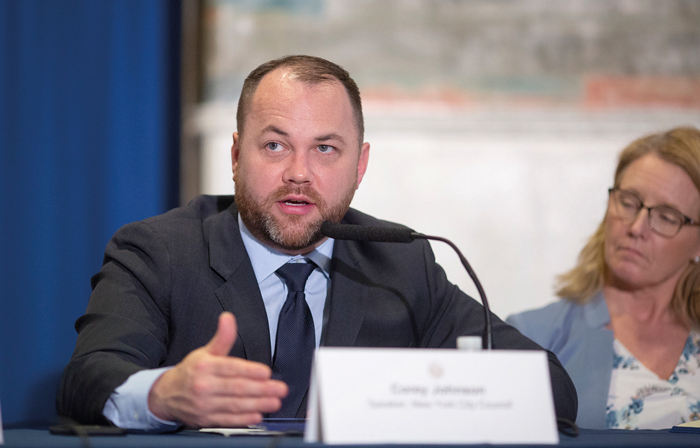Photo Courtesy of John McCarten/NY City Council
On Thursday, City Council Speaker Corey Johnson proposed a $12 billion relief plan to help city businesses and workers impacted by the coronavirus pandemic.
By Michael V. Cusenza
Over the past three weeks, small businesses across the city have been absorbing an economic beating the likes of which most, if not all, have never experienced.
And so, elected officials on all levels have been urging administrations to direct robust financial support to these hard-hit establishments.
On Thursday, City Comptroller Scott Stringer penned an open letter to small business owners detailing what governments must do to help small businesses survive, recover, and rebuild in the economic fallout of the coronavirus pandemic.
“We need to act now to protect our workers and our economy. I urge the City to immediately take the following steps to provide urgent relief to our small businesses:
Suspend all collections of outstanding small business fines for six months;
Automatically renew all licenses and permits (liquor licenses, sidewalk café licenses, Health Department permits, etc.) without payment of fees, for the next three months;

Forum Photo by Patricia Adams
Small businesses on block after block of Liberty Avenue, like this one near 113th Street in Richmond Hill, have been shuttered for weeks.
Suspend payment of the Commercial Rent Tax for two months for ground-floor retail businesses with demonstrated business losses;
Expand the City Department of Small Business Service’s no-interest loan program to include any business of up to 100 employees that has experienced a significant quarterly decline in revenue, and increase the maximum loan amount to $150,000;
Enact immediately legislation capping delivery platform fees at 10 percent. Deferring fees, as GrubHub and others are doing, is simply not good enough, and is taking advantage of businesses that are already struggling to just survive;
And in addition, the State should consider a limited sales taxes holiday for all restaurants, hotels, and street-level retail stores.
“Once the public health is stabilized and businesses are allowed to re-open, the State and City should join to create a “Re-Start” loan and grant program to help small independent businesses that have closed temporarily to re-open their doors, re-hire their workers, and welcome back their customers,” Stringer wrote.
The comptroller noted that the above measures would cost the City and the State millions of dollars in lost revenue, on top of the projected lost sales, income, and other tax revenues caused by the current crisis—at least $3 billion in the next six months—and likely more as long as the fight to contain the pandemic continues.
“Our small businesses, our arts community, and our cultural organizations are core to our economy and our identity as a city,” Stringer concluded his missive. “Our workforce is the best in the world. I urge all levels of government to act now to make sure that we can recover and rebuild—stronger than ever before.”
Additionally on Thursday, City Council Speaker Corey Johnson proposed a $12 billion relief plan to help city businesses and workers impacted by the pandemic.
According to Johnson, the components of the plan include:
Institute a temporary universal basic income: New York’s economy needs an immediate boost. Even if current federal proposals for immediate payments of $1,000 or $2,000 to Americans pans out, the impact of those dollars is far less in New York than almost every other city in the country, Johnson noted. Under the Council’s proposal, every Gotham resident would get money in their pocket—$550 for each adult and $275 for each child.
Provide extra help for impacted New Yorkers: Unemployment insurance is a critical safety net, but it doesn’t provide enough support and doesn’t cover enough workers, Johnson said. Right now, unemployment helps less than half the unemployed and provides people with less than half of what they need.
“To truly provide comprehensive coverage, we must temporarily expand eligibility for unemployment to freelancers, gig workers, and those who have had their hours reduced. This plan would also temporarily enhance benefits for everyone by 30 percent,” Johnson wrote. “To do so, we would also need to shore up New York’s unemployment insurance trust fund, which started the year with a balance of $2.6 billion. With this massive surge in workers applying for benefits and fewer businesses paying in, the fund won’t hold out long. Under this proposal, we can continue providing benefits without depleting the trust fund.”
Cover fixed costs for businesses: The City needs to make sure that impacted small businesses are able to survive until a return to normalcy, Johnson said. Businesses have certain bills that need to be paid whether or not they’re operating—rent, utilities, loan payments, insurance, and taxes. Getting cash in their hands during this crucial period is essential, the speaker noted.
To do this, the City must: Immediately defer sales and use taxes due in March, as well as the commercial rent tax and business taxes; institute penalty-free deferment of the collection of City fees, such as sidewalk cafe fees and permit renewal fees. For many businesses, that will mean an instant influx of thousands of dollars; build on the City’s small business loan program by expanding eligibility to reach more businesses and increasing the maximum loan amount to $250,000.
“These should be structured as zero-interest loans, but the City, with the help of the federal government, should be prepared to forgive some of this debt if it’s necessary to keep businesses afloat,” Johnson wrote. “All these programs must also be expedited to get money out the door as quickly as possible to help prevent permanent closures and save jobs.”
Johnson is calling for the plan to be paid for by the federal government. If the federal government fails to step up, it can be funded by bonds. The City has a history of selling bonds to rebuild its economy after a disaster, including after the terror attacks of Sept. 11, 2001.

